#black indigenous africans
Text

The Black on Black Love Movement is a social movement that celebrates and promotes love, unity, and healing within the Black community. It is a response to the systemic racism and oppression that Black people have faced for centuries, which has led to trauma, self-hatred, and violence within the community.
The movement is based on the belief that Black love is the foundation of a strong and thriving Black community. It encourages Black people to love and support each other, to heal from their wounds, and to work together to create a better future for themselves and their children.
The Black on Black Love Movement is manifested in many different ways, including:
Social media campaigns: The movement has a strong presence on social media, where people use hashtags like #BlackLove and #BlackOnBlackLove to share stories, images, and videos of Black love and joy.
Art and culture: Black artists and creators are using their work to promote the Black on Black Love Movement. For example, there are many films, books, and TV shows that celebrate Black love and relationships.
Community events: Organizations and individuals across the country are hosting community events to promote Black love and unity. These events can include things like potlucks, movie nights, and workshops on Black relationships and parenting.
The Black on Black Love Movement is still in its early stages, but it is growing rapidly. It is a powerful and important movement that is helping to heal the Black community and create a better future for Black people everywhere.
Here are some specific examples of the Black on Black Love Movement:
The Black Love Campaign is a non-profit organization that is dedicated to promoting Black love and unity. The organization hosts community events, produces educational materials, and advocates for policies that support Black families and relationships.
The Black Girl Magic movement is a social media campaign that celebrates the beauty, strength, and resilience of Black women. The movement is a reminder of the importance of Black self-love and community.
The Black Boys Joy movement is a social media campaign that highlights the positivity and joy of Black boys and men. The movement is a counter-narrative to the negative stereotypes that are often associated with Black men.
These are just a few examples of the many ways that the Black on Black Love Movement is being manifested. The movement is a powerful and important force for change in the Black community.
“Racists will always call you a racist when you identify their racism. To love yourself now - is a form of racism. We are the only people who are criticized for loving ourselves. and white people think when you love yourself you hate them. No, when I love myself they become irrelevant to me.” ― John Henrik Clarke tags: racism, racists.

The Black History Channel and all of it's affiliates are proud supporters of The Black On Black Love Movement.
#black love#black history#black positivity#black africans#global black on black love#global black unity#black indigenous people#black indigenous africans
226 notes
·
View notes
Text
Like halfway through "how Europe underdeveloped Africa" cause I decided I'd read/listen to it after I had a strong base on knowledge on African history and just holy fuck is he right about nearly everything so far.
Having learned about how extensive African trade was prior to the 18th century and how heavily most African kingdoms shifted in the 16th it's very clear that what he points out in the way the slave trade and the need to aquire firearms grew the European economies while near completely emptying out African economies and how the hard shift to European import goods after Europe had grow through the use of African slave labor and monopoly of trade routes is still a largely still at play in the era of neocolonialism.
The way that Walter Rodney not just points out that this is true, but the depth to which he covers a variety of African kingdoms, their economies, and cultural practices puts even some college level courses to shame while also showcasing the exact ways in which some of these stronger or more expansive kingdoms like the Ashanti, oyo, borno, Kongo, and Benin kingdoms had explicitly tried everything to get guns through any other trade and how the Ashanti, merina, Ethiopian, Burundi Benin kingdoms sought our education and scholars to begin industrialization and the systematic way in which Europeans and Americans prevented that is just, well it's damming.
It's a continuing reminder how from the first stage of European expansion and control they had precisely zero good intentions for the peoples of Africa. That Europe saw Africa as nothing more than a way to grow itself, it's institutions and improve its economies by depriving Africa of labor, materials and freedom which is true to this day, most starkly in the Congo but true across the whole region.
But while the book shows the crimes of Europeans without sugar coating, it also doesn't glorify the African leaders and more importantly those that became collaborative with European despitism. It also does not abide by the word games the European powers like to play and goes in depth to the way Europeans had no actual interest in ending slavery, and that while invading the various kingdoms and communities to "end slavery" the created some of the most brutal slave conditions on this side of the globe, not just in Leopolds Congo but in French forced labor camps and British controlled regions, with the Portuguese being particularly up front about it.
Truly a shame that like most other black radicals Rodney was murdered so young. The rarity to which black radicals even get to 40 shows how desperately capitalist and white supremist try to prevent even the slightest push back from black voices. It also makes clear how much we all need to know this stuff, from debois's black reconstruction to nkrumah's neoimperialism these books give a great understanding of the past and the precise way in which we arrived to the current situation.
I pray that with the new scramble for Africa that is unfolding in front of our very faces, the genocides in the Congo, and Sudan, and the way in which these interlock with the genocide of Palestinians, that we all take the time to properly read and reflect so that we may properly organize and fight back for a fully free and sovereign Africa and Palestine and a world free from white supremacy.
#black liberation#colonization#politics#indigenous liberation#world of the oppressed#pan african#the colonized#How Europe underdeveloped Africa#walter rodney
624 notes
·
View notes
Text
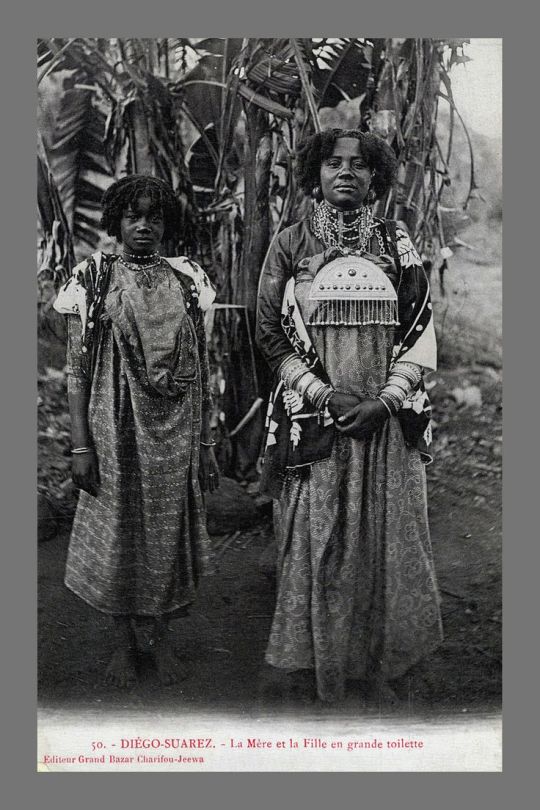
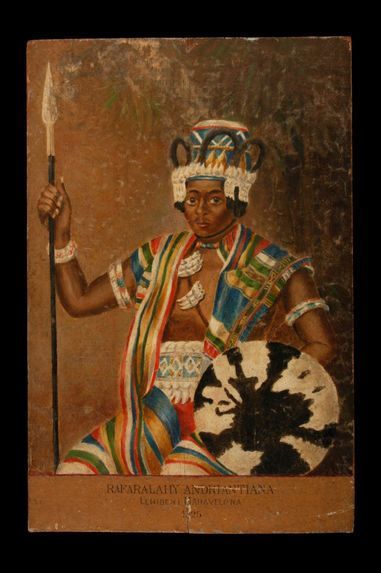
MADAGASCAR PEOPLE
#madagascar#melanin#black family#blacknificent#good black imagery#black is beautiful#melanaire#boycott#black man#black woman#black child#africa#afrika#african#comoros islands#zanku#afrobeat#zouk#unity among ghetto groups#black group economics#ghetto economics#victims of white supremacy#black history is world history#runoko rashidi#dr ivan van sertima#stacy tisdale#dr frances cress welsing#madagascar people#indigenous#aboriginal people
99 notes
·
View notes
Text




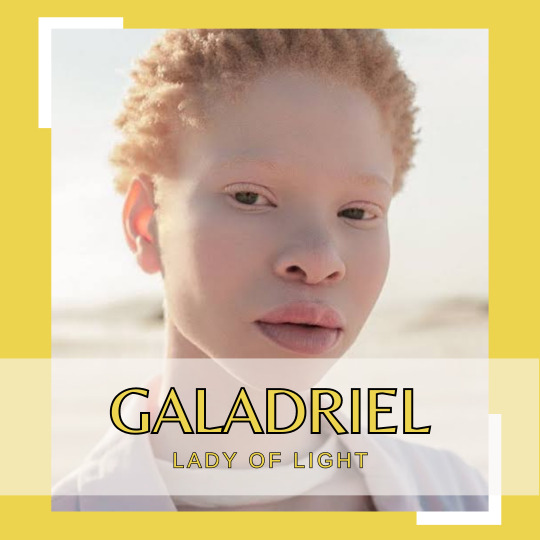


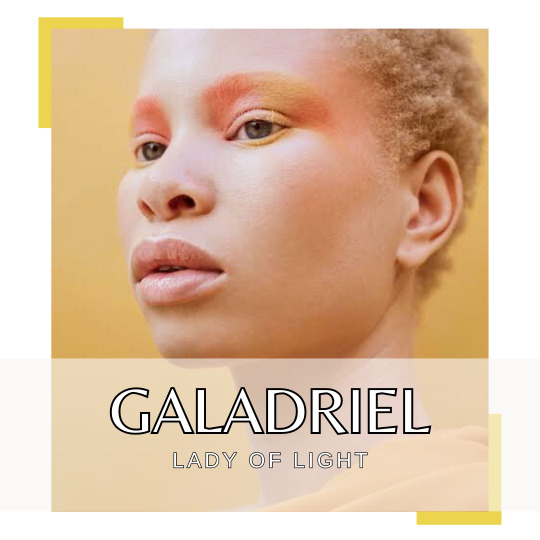
Galadriel in aroace colours for Day 1 @aspecardaweek 🧡💛🤍💙🔵
Part 15 of toi's indigenous tolkien series
[Image description: edit in yellow/blue/white/orange
1: Nontobeko Mbuyazi sitting with one arm on her knee. She is a albino Zulu woman. Photo is orange, background is blue, text = Galadriel, Lady of Light
2: art (The Trees of Valinor by Aronja-Art, link to original)
3: white messy fabric
4: Nontobeko Mbuyazi in front of window. Photo has blueish greenish tones and background is yellow. Same text as before
5: Nontobeko Mbuyazi in front of a pale sky. Picture is white and background is yellow. Same text as before
6: a glass beach (beach covered in many-coloured sea glass worn down to pebbles)
7: a blue forest
8: Nontobeko Mbuyazi with orange eye make-up. Photo is orange and background is white.]
#galadriel#silmarillion#lotr#the third age#tolkien women of colour#black tolkien#southern african tolkien#disabled character#moodboards and edits#toi's creations#toi's indigenous tolkien series#aspecardaweek#mepoc#contains image description#for prompt: asexual
153 notes
·
View notes
Text
#talkin#tik tok#africa#indigenous Africans#gullah geechee#gullah gullah island#nickelodeon#black history#african diaspora
314 notes
·
View notes
Text
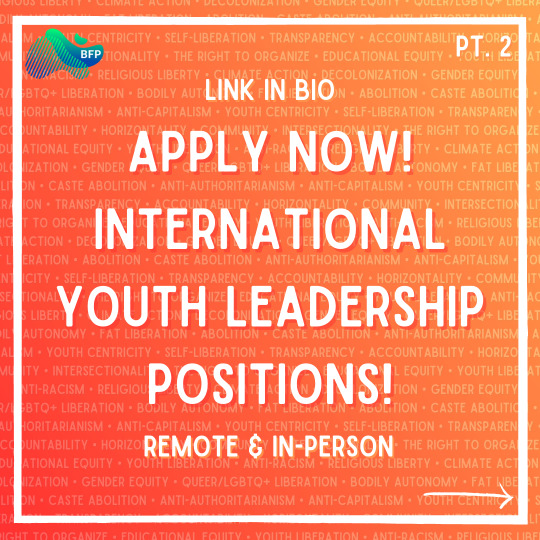
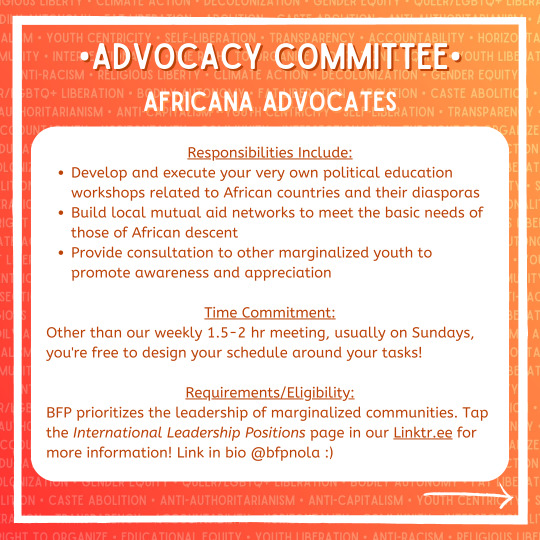
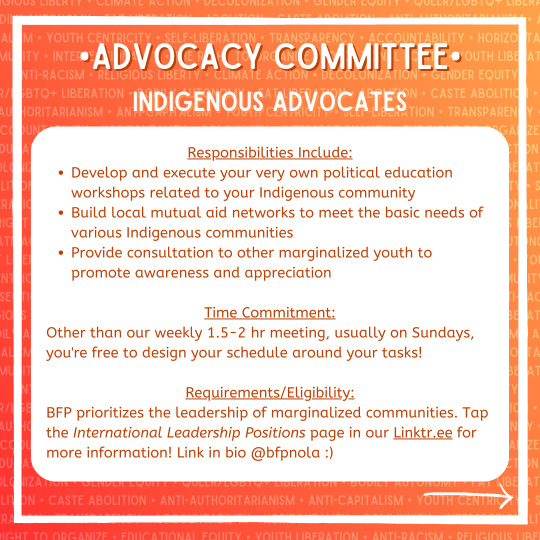
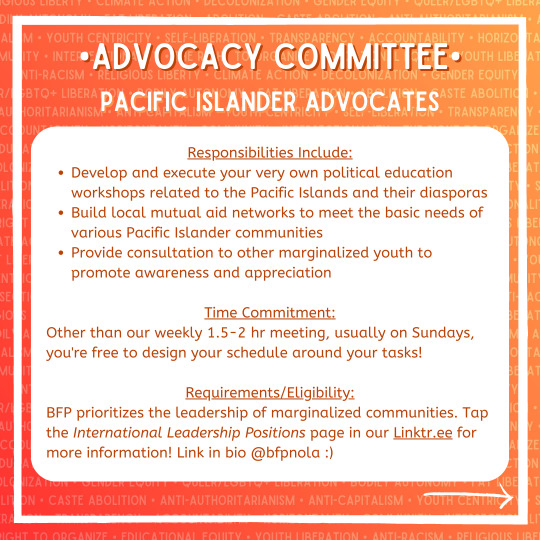


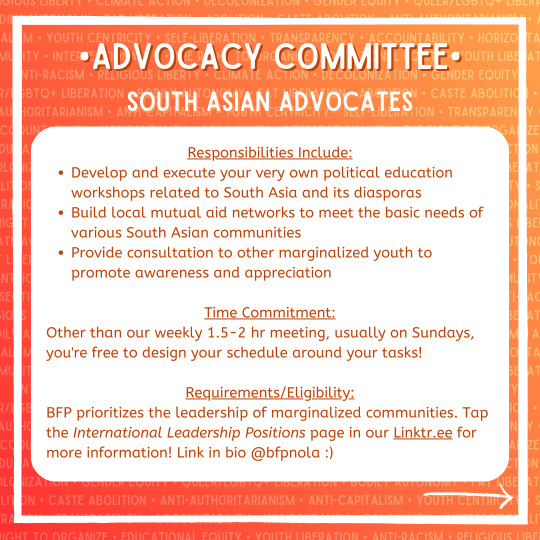
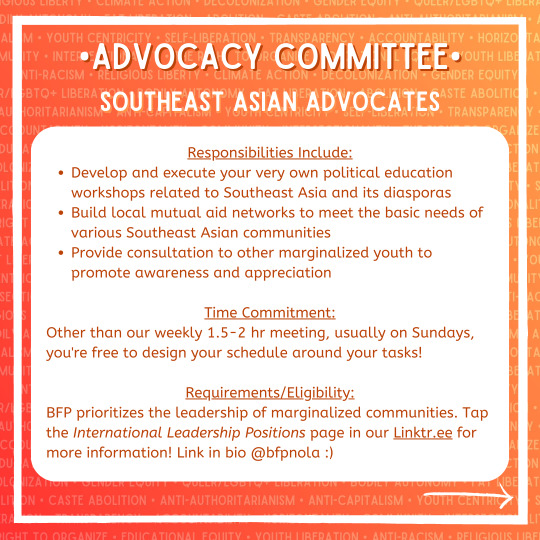

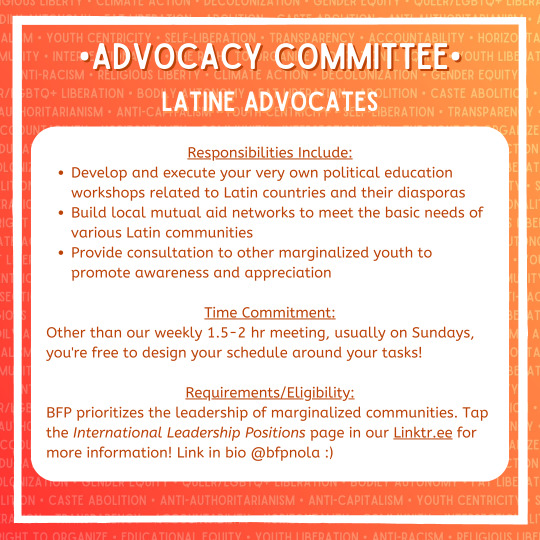
Hey! We're back with part 2! Better Future Program (@bfpnola) is officially looking for youth volunteers between the ages of 14 and 25 for our Advocacy Committee. Don't see a role that fits your identity or beliefs? Don't worry! We've got SO MANY opportunities, we had to split them up across multiple posts! Feel free to check our Linktr.ee for more positions or our "Apply Now!" highlight on Instagram in the coming weeks!
And if you don’t know who we are? Welcome! BFP is Black-, queer-, and woman-owned nonprofit, entirely run by youth! Since 2016, we’ve been accepting volunteers not just from Bulbancha (so-called New Orleans, Louisiana), but WORLDWIDE! Our mission is to globally expand peer-led political education, support, and imagination for marginalized youth!
To fulfill this goal, we offer over 3,000 free resources through our Liberation Library, design and execute mutual aid-based projects, and offer the safe space young activists need to ask questions and grow. If this sounds like something you’d be interested in, check out our International Youth Leadership Positions page in our bio!
Image description below.
[ID: All slides share the same background. There is a repeating list of BFP’s guiding principles and core beliefs in translucent, all-white, capitalized letters. BFP’s guiding principles include youth-centricity, self-liberation, transparency, accountability, horizontality, community, and intersectionality. BFP’s core beliefs include the right to organize, educational equity, youth liberation, anti-racism, religious liberty, disability justice, climate action, decolonization, gender equity, queer/LGBTQ+ liberation, bodily autonomy, fat liberation, abolition, caste abolition, anti-authoritarianism, and anti-capitalism. A burnt orange to amber gradient overlays this list. A bold, white square frames the image with a white arrow pointing right in the bottom right corner.
Slide 1 reads: “LINK IN BIO. APPLY NOW! INTERNATIONAL YOUTH LEADERSHIP POSITIONS! REMOTE & IN-PERSON.” There is a BFP logo in the lefthand corner and the words “Part Two” in the righthand corner, as this is the first of multiple posts showcasing open leadership positions.
Slide 2 reads: "Advocacy Committee: Africana Advocates
Responsibilities Include:
Develop and execute your very own political education workshops related to African countries and their diasporas
Build local mutual aid networks to meet the basic needs of those of African descent
Provide consultation to other marginalized youth to promote awareness and appreciation
Time Commitment:
Other than our weekly 1.5-2 hr meeting, usually on Sundays, you're free to design your schedule around your tasks!
Requirements/Eligibility:
BFP prioritizes the leadership of marginalized communities. Tap the International Leadership Positions page in our Linktr.ee for more information! Link in bio @bfpnola :)"
Slide 3 reads: "Advocacy Committee: Indigenous Advocates
Responsibilities Include:
Develop and execute your very own political education workshops related to your Indigenous community
Build local mutual aid networks to meet the basic needs of various Indigenous communities
Provide consultation to other marginalized youth to promote awareness and appreciation
Time Commitment:
Other than our weekly 1.5-2 hr meeting, usually on Sundays, you're free to design your schedule around your tasks!
Requirements/Eligibility:
BFP prioritizes the leadership of marginalized communities. Tap the International Leadership Positions page in our Linktr.ee for more information! Link in bio @bfpnola :)"
Slide 4 reads: "Advocacy Committee: Pacific Islander Advocates
Responsibilities Include:
Develop and execute your very own political education workshops related to the Pacific Islands and their diasporas
Build local mutual aid networks to meet the basic needs of various Pacific Islander communities
Provide consultation to other marginalized youth to promote awareness and appreciation
Time Commitment:
Other than our weekly 1.5-2 hr meeting, usually on Sundays, you're free to design your schedule around your tasks!
Requirements/Eligibility:
BFP prioritizes the leadership of marginalized communities. Tap the International Leadership Positions page in our Linktr.ee for more information! Link in bio @bfpnola :)"
Slide 5 reads: "Advocacy Committee: Central Asian Advocates
Responsibilities Include:
Develop and execute your very own political education workshops related to Central Asia and its diasporas
Build local mutual aid networks to meet the basic needs of various Central Asian communities
Provide consultation to other marginalized youth to promote awareness and appreciation
Time Commitment:
Other than our weekly 1.5-2 hr meeting, usually on Sundays, you're free to design your schedule around your tasks!
Requirements/Eligibility:
BFP prioritizes the leadership of marginalized communities. Tap the International Leadership Positions page in our Linktr.ee for more information! Link in bio @bfpnola :)"
Slide 6 reads: "Advocacy Committee: East Asian Advocates
Responsibilities Include:
Develop and execute your very own political education workshops related to East Asia and its diasporas
Build local mutual aid networks to meet the basic needs of various East Asian communities
Provide consultation to other marginalized youth to promote awareness and appreciation
Time Commitment:
Other than our weekly 1.5-2 hr meeting, usually on Sundays, you're free to design your schedule around your tasks!
Requirements/Eligibility:
BFP prioritizes the leadership of marginalized communities. Tap the International Leadership Positions page in our Linktr.ee for more information! Link in bio @bfpnola :)"
Slide 7 reads: "Advocacy Committee: South Asian Advocates
Responsibilities Include:
Develop and execute your very own political education workshops related to South Asia and its diasporas
Build local mutual aid networks to meet the basic needs of various South Asian communities
Provide consultation to other marginalized youth to promote awareness and appreciation
Time Commitment:
Other than our weekly 1.5-2 hr meeting, usually on Sundays, you're free to design your schedule around your tasks!
Requirements/Eligibility:
BFP prioritizes the leadership of marginalized communities. Tap the International Leadership Positions page in our Linktr.ee for more information! Link in bio @bfpnola :)"
Slide 8 reads: "Advocacy Committee: Southeast Asian Advocates
Responsibilities Include:
Develop and execute your very own political education workshops related to Southeast Asia and its diasporas
Build local mutual aid networks to meet the basic needs of various Southeast Asian communities
Provide consultation to other marginalized youth to promote awareness and appreciation
Time Commitment:
Other than our weekly 1.5-2 hr meeting, usually on Sundays, you're free to design your schedule around your tasks!
Requirements/Eligibility:
BFP prioritizes the leadership of marginalized communities. Tap the International Leadership Positions page in our Linktr.ee for more information! Link in bio @bfpnola :)"
Slide 9 reads: "Advocacy Committee: West Asian Advocates
Responsibilities Include:
Develop and execute your very own political education workshops related to West Asia and its diasporas
Build local mutual aid networks to meet the basic needs of various West Asian communities
Provide consultation to other marginalized youth to promote awareness and appreciation
Time Commitment:
Other than our weekly 1.5-2 hr meeting, usually on Sundays, you're free to design your schedule around your tasks!
Requirements/Eligibility:
BFP prioritizes the leadership of marginalized communities. Tap the International Leadership Positions page in our Linktr.ee for more information! Link in bio @bfpnola :)"
Slide 10 reads: "Advocacy Committee: Latine Advocates
Responsibilities Include:
Develop and execute your very own political education workshops related to Latin countries and their diasporas
Build local mutual aid networks to meet the basic needs of various Latin communities
Provide consultation to other marginalized youth to promote awareness and appreciation
Time Commitment:
Other than our weekly 1.5-2 hr meeting, usually on Sundays, you're free to design your schedule around your tasks!
Requirements/Eligibility:
BFP prioritizes the leadership of marginalized communities. Tap the International Leadership Positions page in our Linktr.ee for more information! Link in bio @bfpnola :)"
/End ID.]
#reaux speaks#hiring#volunteer#youth activism#african#african diaspora#african american#black power#indigenous#aboriginal#first nations#native american#pacific islander#central asia#west asia#south asia#southeast asia#east asia#latine#latinx#chicano#advocacy#youth#high school#middle school#university#remote#in person#hybrid#abolition
76 notes
·
View notes
Text
i want to make a sewing piece with flowers from different liberation movements — e.g. lavender for queers, poppy for Palestine...
anyone have information on flowers linked to other movements / cultures? For instance, Black liberation or Latin American / Indigenous liberation?
#rn i'm thinking of doing a rose for Indigenous America because they#are native to here + are meaningful to various cultures#+ they make me think of Latin American liberation theology bc of their association with our lady of guadalupe#and the flower of a black-eyed pea for Black liberation because enslaved Africans were able to bring those plants with them#to the americas and nourish themselves with that memory of home#could also do sunflowers as an important staple crop to many Native American cultures (“the fourth sister”)#plus apparently sunflowers were used in some feminist movements? but i'll have to look into which ones Just In Case#averygaypost
25 notes
·
View notes
Text
I come from a long line of people who raised hogs, smoked them in the earth as technique inherited from indigenous kin (who - more broadly - introduced the west to the method: more on that here!) and seasoned them beautifully.
so pork specifically meant a lot to my family... but it is also undeniably tied to hereditary health problems...
so here's a story on how we departed from that, what tradition even is, and what it means to me now ft the humble black eyed pea, for EATER!
some of my favorite panels:

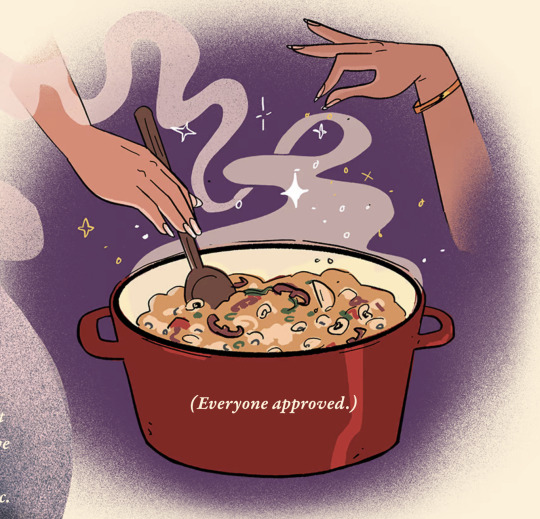
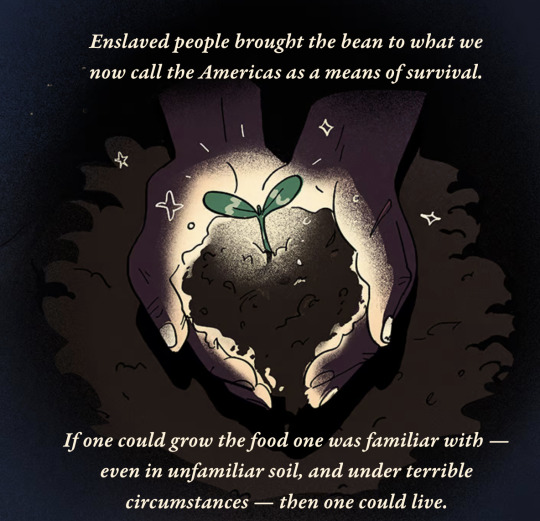
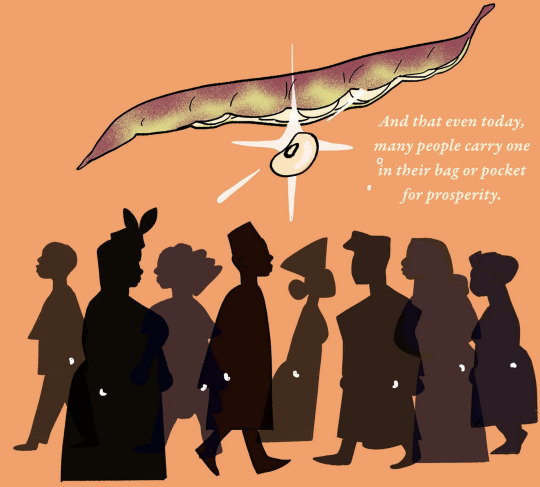
find the recipe for Yoruba àkàrà in my new book, COOK LIKE YOUR ANCESTORS <3
#art#comic#comics#illustration#cartoon#love#food#africa#african american#foodways#native#indigenous#barbecue#black eyed peas#heirlooms#mariah-rose marie#cook like your ancestors
36 notes
·
View notes
Text
Negroes watch YouTube conspiracies and take everything as facts . They wanna be everything but African cause they have self hate
92 notes
·
View notes
Text

The original women (non white) are Earth in the 5% Nation of Gods and Earths!
Via Divine Allah (Divine Ortiz) on Social media
#nation of gods and earths#supreme mathematics#five percent nation#allah school in mecca#5% nation of gods and earths#mixed race#biracial#black woman#african american#women of color#asian women#latinas#chicana#indigenous women#father allah#hip hop
30 notes
·
View notes
Text


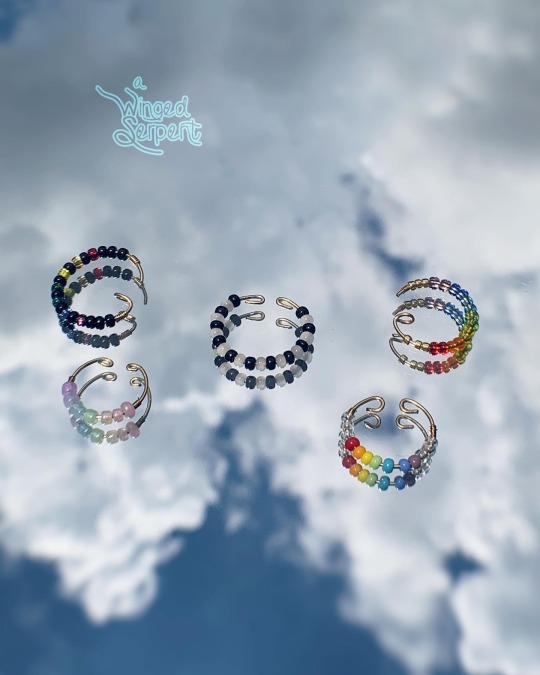


Made to order beaded and wire wrapped jewelry
You are your own culture. Wear it.
~shop link in bio~
Awingedserpent.bigcartel.com
#handmade jewelry#black owned#beaded jewelry#rainbow#african beading#indigenous beadwork#accessories#shops#fashion#waist beads#crystal jewelry
187 notes
·
View notes
Text
THE BEAUTIFUL CLICK LANGUAGES OF AFRICA
youtube
The click language is the foundation of all world languages. Africa tells the human story of the world but not even most Africans themselves don't know this.
People living outside of Africa knows more about African prehistory better than most Africans who are born and live on the African continent. Scientist knows more about African prehistory history better than anyone because science were first used in Africa by Africans before the world knew anything about science.
#black love#black positivity#black africans#black history#science#evolution#science side of tumblr#black on black love#indigenous solidarity#indigenous nations#indigenous history#black indigenous africans#Youtube
36 notes
·
View notes
Text
This is technically an attoye dream I had but I’m turning it into a free write story and gonna hyper fixate on this for a few days.
Historical romance price set in 1820-1870
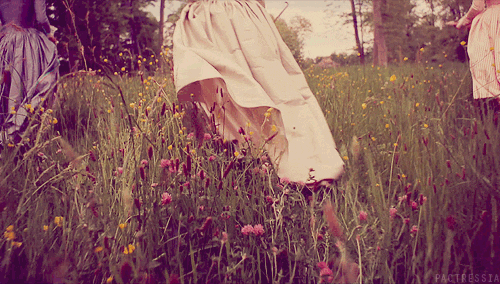
A Muscogee indigenous boy, named Michael by the catholic school, is angry at the injustice of the world and wants to be free from his native residential school in Georgia. At 19, He is too old to continue school and refused to learn to read English, he can only speak it enough to converse with his bosses.
As a factory worker, he meets Miss. Celia, a 17 year old slave girl who is soft spoken and sensitive to the world. He sees her being harassed by a drunk plantation owner and protects her before she takes him to her home to patch him up.
He tells her his real name is Takoda Lanon , and she calls him that from now on.
When she figures out he can’t read, she attempts to teach him but he grows frustrated, but he continues to try because he is falling in love with her. And she is falling in love with him.
He sneaks to her little cabin in the fields every night to eat her food and try to get , her to run up north with him. She is hesitant as her life on the plantation is all she has ever known. When he gets her pregnant, she knows she has no choice however: if they find out who got her pregnant, they’ll kill her baby and hang Michael.
Will they escape Georgia before she begins to show, will he be caught running away from the catholic school? 🤭
#creative writing#fiction#fanfiction#original character#original story#x black reader#black women#slavery#indigenous#native#African#african american#history#black history#historical#romance
23 notes
·
View notes
Text

#short story collection#short story collections#nameless woman#nameless woman: an anthology of fiction by trans women of color#ellyn peña#jamie berrout#various authors#venus selenite#21st century literature#english language literature#american literature#african american literature#black literature#latino american literature#indigenous literature#have you read this short fiction?#book polls#completed polls
19 notes
·
View notes
Text
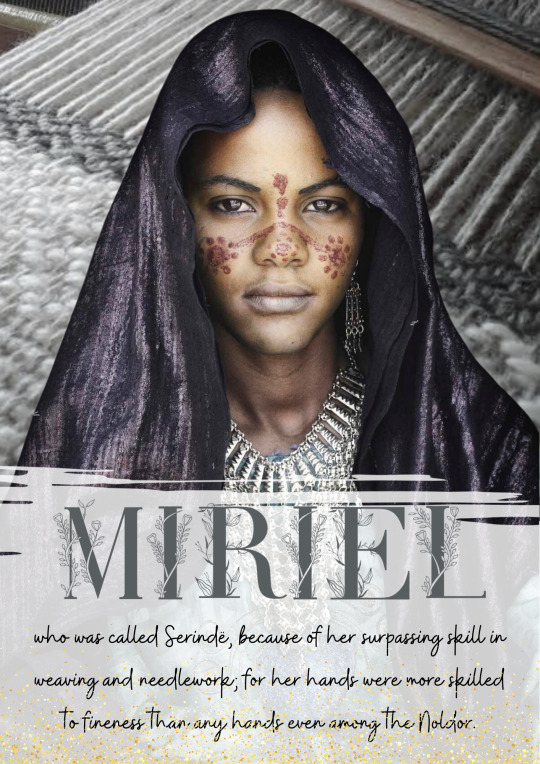

Day 1 of @finweanladiesweek
Part 26 of toi's indigenous tolkien series
[image description
1: a north African woman wearing a headscarf. The background is grey weaving. Text = MIRIEL who was called Serindë, because of her surpassing skill in weaving and needlework; for her hands were more skilled to fineness than any hands even among the Noldor
2: a east African woman wearing gold. Background has the ruffles of a dancers dress. Text = INDIS laboured not with her hands, but sang and made music, and there was ever light and mirth about her while the bliss of Aman endured.]
#indis#finweanladiesweek#silmarillion#tolkien women of colour#west african tolkien#(fulani + tuareg woman from niger)#black tolkien#east african tolkien#(south sudan)#moodboards and edits#toi's indigenous tolkien series#toi's creations#contains image description#mepoc#miriel therinde
81 notes
·
View notes
Text
How Europe underdeveloped Africa and its legacy
first and formost before i break this down, this is not a post for white people to express their guilt, or savoir complex or love of historical revisionism. you'll not just be blocked, you'll go on a block list on this post, don't do it to yourself, i wont even have to be the one to do it. secondly this is a covering of the broad themes, lessons, and understanding within the book and what we should learn from it. third, i will often talk from my own perspective from which i will round to a larger context.
part 1- history and anthropology
As someone who has grown up black in the us, i grew up with a particular understanding or idea of Africa, the slave trade and the way America and Europe came about. you hear about tribal or ethnic disputes in the context of modern Africa and hear quite a lot of blatantly racist things about Africans. which caused me to get very into history, to which you learn when it comes to Africa there's not a lot of great places to start. this is something quite similar to the various indigenous peoples of the Americas as well. this has always been presented to me as a fault of Africans for not having history and is a long standing idea of white intellectuals from the 1800s to the Joe every man of today. the truth is Africa has history, there's no land, that has no history and Europe just devalues histories not associated with itself. there's a absolute glut of kingdoms, empires, languages, historical traditions, governing styles, cultural roles, trade networks etc etc. the fact of the matter is, that there's just very little Europeans want to learn about Africa that isn't to colonial ends, even today.
This is something Walter covers in great detail, to such a point that even as someone that has been purposely elbows deep into listening to everything i can find on African history i still had to go look up various pre-colonial kingdoms and figures. there is not a region of Africa that he doesn't take time to address in at least some detail, from Oyo and Ashanti on the west African coast, to the north of the Maghreb with Morocco and Algeria, east to the great lakes region, the horn of africa and south to the Zulus, koi koi, and Nguni peoples and kingdoms. The extensiveness to which he covers material forms of production, trade, and methods of historical preservation of culture, the types and breath of items, created and traded all through like cloth, glass, iron working, artistic ventures like bronze sculptures of benin and food production and cultization and the formations of various styles of rule, early democracy, and other such information put to bed nearly all of the non-nonsensical ideas that africa was a grand continent without progress, innovation, or skills and everything great, large, or more complex than rubbing to sticks together came from europe or arabs.
The book delves quite deep into the mythology of intense african slavery and violence which would be later used by europeans to justify colonization of africa to each other, said colonization, i will swing around back to much as the book does.
The middle passage, the triangle trade, the atlantic slave trade, these are all names for the event that was one of the chief reason to the economic and scientific take off of europe that would lead to industrialism, with the other being the colonization of the americans. stolen land and labor pushed the european world from not much a concern to anyone but those who had to deal with the crusades to the paramount power that controlled nearly all the sea trade, and held large swaths of territories of the world. we all know most of that, but walter ask the question on the other side of that coin. what did the slave trade do to africa? and why did they participate? the short answer is it changed the entire way african economies functioned and lessened the possibility of growth not just of kingdoms over territories, but of production and developement of sectors such as iron working, glass making, and agriculture. and in a very literal sense was one of the earliest forms of the phenomenon known today as brain drain and depopulation. we quite literally will never know the amount of people stolen or killed for slavery, we only know that as the rest of the world experienced high population growth africa and the americas started to experience intense depopulation. these phenomena weren't incidental they were known, and admitted as purposeful by figures qouted in the book. The african leaders at the time how ever were stuck between a rock and a hard place, many noted not just the importance of guns, but also recognized the importance of population growth at the onset. the game however being rigged from the start would have taken a miracle to over come. japan was the one country to escape colonialism in most meaningful senses, and that was because the dutch taught them how to produce guns and would trade with them "almost" as equals. these are also things addressed by rodney, the sale of arms was often highly lopsided, with Portugal and dutch traders only being willing to trade badly produced or broken guns, low quality powder and shot for slaves. this would not change until europeans would learn of other african products that they could make us of in their markets as raw materials such as ivory or kola nuts, this change would not happen for quite a while and mainly after the Europeans had already built their industrial bases and had taken total control of trade routes and begun to flood African markets with "cheap" products. the combinations of factors both purposeful and accidental shifted the African economies into a near total reliance on Europe economically and militarily but not yet politically. these are all expertly researched and explained to a point it is nearly impossible to refute any points. This points are all also something i can confirm from nearly every single source that ive looked into on African history.
part 2 -colonial "development"
This is a portion of history ill admit to doing my best to stay away from, generally much of my knowledge on it till this book has been on what happened with various kingdoms that fell in the late 1800s and early 1900s or by the various oral and 3rd hand accounts of what peoples familes, parents and even political elites went through. ill be frank, i did not go into the depth of the horrors of what happened with slavery, slave raiding, and its secondary effects, for this section and the next ill have to go through quite a lot. ill try to tone it down as best as i can, but on some of it even the implied parts are going to be horrid. I believe it is however important to face those head on, to truly understand the so called "white mans burden" or the reality of what that meant was.
colonialism meant making the final step, taking africa politically and physically. europe made the leap whole heartly to take all of africa, land, people, and any potential valuables, resources and to exploit everything they could get their hands on to the fullest extent possible. i do not use anything in the prior sentence lightly. Europeans like to play word games and often, the idea that they ended slavery in any meaningful sense is false, and ill come back to that in the final section. during the period of colonial control europeans destroyed just about anything of the prior rulers they could, and stole anything they could. theres a likelihood in my mind that theres many and african sculpture, painting, and cloth or glass work that sits in the home of a collector that got rich off the stolen plunder of africa. these includes many villages, cities, and palaces and shires and places of worship and places of craft. whole cities were destroyed such as kumasi, taking with it histories, architectural stylings and methods of production.
during this period was the final shift from internal political and economic growth to purely serving the empires to which ones lands belonged. no longer would rulers push for education reforms or challenges on religious bodies to strengthen any part of the nation, it was a total transformation into a form of state slavery. this is as metaphorical as literal, europeans would begin to change agriculture to be primarily centered around cash crops and mining labor to which labor was forced. people were made to pay taxes in the modern sense through the wages made through said labor. these taxes were in turn used primarily to fund the upkeep of oppressive forces and funding the check books of colonial governors, an insanely tiny portion of these funds were used for anything besides extracting wealth and resources.
the various governments put little to no money, research, or development into anything but cash crops and pulling things out the ground. the only times they put money into schools, training or even medical resources for people in African, it was for better wealth extraction and always the bare minimum. i believe (don't have the book in front of me rn) west Africa (from west of chad and south of Algeria) only had one university until the late 50s. the industrial sector of Africa was near completely killed, Africans in settler areas were not allowed to own even small scale industrial machinery such as cotton gins or fruit oil extraction machines, in non-settler state areas generally only peoples brought into Africa for the purpose of being a separated class of petite boug representatives for the colonizers were allowed to own industrial machinery. electricity was mostly for those same classes of individuals, hospital access, education access, pretty much anything you need for a community to survive esp in the modern era was highly restricted from Africans. To say that Europe "developed" Africa in any sense is beyond a bold faced lie, and it was something ,Rodney points out, that Europeans were quite proud of until they started to face push back for the level of humanity and exploitation they were facing. Once they started to get pushed out they changed their tune to the lie of African development and modernization. just like the lie of ending slavery for moral reasons and invading Africa to end slavery. Speaking of ending slavery in Africa, Rodney points to several figures who openly gloated about how they ran their colonial post or corporate holdings as slave plantations. king Leopold is one of the more famous examples of it, but far from the only one, many took delight in their cruelty. famine became endemic in regions that were the origins of many foods and cultivates crops, as all the agricultural process that could be shifted to cash crops were. Roads and trains ran from the mines and plantations to the seas and very little else. Various things needed to export raw materials were built with slave labor, like a airport in Kenya built by hand, no machinery via forced labor of Kikuyu peoples
Europe's only goal in Africa was land and profits, the same as in the Americas. genocide, slavery, starvation campaigns were common tools of colonizers in Africa all the way up to today, which i will re-address in part 4.
part 3 - education, traditional and political
Education is a very clear and important part of modern life, but also for building a nation, and self dependence, so it is of no wonder than colonizers thought that it should be restricted in Africa in regards to Africans. The various quotes and framing that Europeans used to dismiss the idea that Africans should have access to any form of formal education sounds exactly like quotes pulled from the most vicious of slavers of the prior centuries in the US and Haiti. One of the most prominent ideas that was education would "spoil" Africans, was a sentiment was also expressed by slavers. this section of the book is very much facts and figures on just how little access to education there was, how little funding went into it vs the amount of profits coming out of the various regions as well as how this was over come. two of the prime ways that was done according to the book and much of what Ive heard prior, was through the use of missionary schools or independent schools. These schools were primarily funded not by the colonial governments but by the peoples seeking education, their families, and so on, with the expectation that those educated would teach the rest of the family. education how ever was shown to not really pull people out of poverty nor to really give African peoples the possibility of positions of power or influence. this was such a near universally a rule, Amilcar Cabral, revolutionary leader and agricultural engineer even spoke to his personal experiences with being educated far beyond the man in charge of him yet having zero say in his job, his boss was renownly a dumb man. This was not an uncommon thing. Rodney goes well into it, and this just exemplifies how Europeans only saw Africans as a source of cheap and "unskilled labor". Access to education even if funded by the peoples seeking education themselves was clamped down on sharply once revolution was on the wind. Those who know the patterns of history though would have known that the clamping down made that worse, it simply accelerated the wants for education, as well as for independence.
part 4 - modern Africa and modern euro/america
When the cards started to fold on empire they took many different routes to lessen the fall for power, France tried blowing thing up and killing cattle and destroying things needed for civil life, a all call for genocide against Algerians. Britian, Portugal, most of them tried the same things, but they were pushed out in some ways, and when that became obvious they turned to the small group of political insiders they rapidly trained to take over in their stead. for those that weren't under the control of the colonizers they turned to the coup and military dictatorship. very few of the revolutionary leaders of africa were able to stay in power, many turned toward methods some would call authoritarian. without the context of what was going on and how unstable the situation was for these leaders and just how quickly and violently these revolutions could be overturned, it would be easy to take these figures as just becoming despots without reason, some of them really did become despots who just started functioning as neocolonial cops. This brings us to the modern era, and the current method of colonialism not just in africa but much of the world, Neocolonialism, or as i like to call it "home rule".
European nations were not ready to give up control, but they decided they would be willing to give up the appearance of direct rule. economic decisions, the political direction of countries, borders, very little of the modern africans situation was not directly decided on by europeans or americans. financial institutions such as the world bank and IMF lend these governments that had to try and start building actual nations with functioning economies loans with interest rates they would not be able to pay back in time, with conditions that made it even hard to meet the internal goals or pay back the loans and additional conditions of economic control by the IMF for failure to pay these loans. colonial governments such as France forced nations like Mali to pay taxes till recently, and nearly all the colonial powers set the trade rules between them and their "former" colonies in Africa. very few leaders were able to chart much of a path for progress or development that met the needs of the people before these various things snatched much of the independence back away from the people, pushing Africa away from shifting toward an agricultural sector that feed the people and an industrial sector capable of growing the economies or a scientific sector able to make adjustments or provide notable push in any direction. Fifa has more say in policy when they decide to host in a country than the people or even large segments of the governments of Africa. Nkrumah and Rodney both in their respective titles showcase this well, however neither would live to see much past the end of overt colonial rule.
Today there is a larger push against neocolonial rule and economic control than prior, organizations such as BRICS, china's one belt one road policy, and smaller grass roots works and various coups have shifted us to a different situation in Africa than what it has been in for the last 80+ years. However this is not a wholly different situation to that my grandmother would have heard of. much of the continent is still very much under euroamerican influence, the us of slave labor or near slave labor conditions is still a significant factor in the economic relationship between Africa and its former colonizers, which is seen very strongly in the Congo and in coco production. Africa is still yet to industrialize in a manner that matches its needs and this is generally at the behest of its colonizers, and in the majority of the continent the colonial capitalist ventures still own land and resources they stole and murdered their way into, settler property relations have also been solidified in places like south Africa. i would believe that Rodney would say that say that Africa still has a long way to go if he was still around.
The themes of the book were quite complex, and it was refreshing in many ways to be presented with such a sober look into Africa. Read the book, understand what its saying and try to use a similar level of consciousness, nuance, and thought in your day to day analysis of the world around you, and we may have a chance at fixing this ship.
To depart from the contents of the book, i would like to address the white man in the room. Europe, its role in history and its modern role in history, like I've said at the top, not time or place for white people tears. I'm going to be brutally honest, and I'm going to combine the thoughts and finding of not just Nkrumah and Rodney, but also figures like Fanon, Malcom X, Kwame Ture,Rev Martin Luther king Jr and many others of the course of Africana histories and philosophies.
Europe, more particularly Western Europe, has spent the last few hundred years visiting horror on horror on the world, when it comes to the modern era, they simply have not stopped. the damage Europe as a bloc has done, much like the amount of people who were enslaved or killed for the slave trade, will never be full accounted for and that tab just keeps growing. There is no sign of it slowing or stopping. Empires don't like to stop existing, this is something those interested in history know very well. The problem is that Europe cannot be honest nor up front about this, be it the League of nations or the EU and America, or even in the face of the UN, Europe and its Settler states it spawned is just as addicted to domination and profit seeking at all cost as it was 100 years ago which was no different when the slave trade began. Europeans/ White people as a whole as still strongly in the belief that they have a moral high ground to speak to the rest of the world when the truth of the matter is for nearly 500 years, white peoples flying European flags have been histories biggest villains. even in the 21st century, Europe's role on the world stage has been that of a vampire. sucking the life from others to sustain itself. it is still violently racist and xenophobic, which is ironic for peoples who have literally invaded the vast majority of the world, nor is it any more moral or upright today than on the eve of colonialism in the Americas or Africa or any other portion of the world. the EU can barely come together today to denounce blatant acts of genocide and white people are finger waging about anti-LGBT laws in places they couldn't point to on a map (im not happy about anti-lgbt shit, im trans bi and poly this shit actually tears me up). Europeans and their settler offshoots boast about the safety of their cities while actively being the cause of the violence elsewhere. This is all to say Europes fucking evil ya'll, which we should all know at this point, but to further it, they aren't really going to stop as that's what its designed to be. these nations aren't going to suddenly produce radical leaders who are going grow morals or empathy and compassion and move us closer to a just world and fight climate change and help develop the global south or anything like that unless some extreme changes happen, not just among the ruling classes, but the everyday person because like i noted, its policies are racist and colonial and imperialistic, but that really only last not just because people aren't willing to guillotine people over it, but because a substantial enough portion of the populace that they care about are happy to be that way or are passive about the suffering of black or brown people or poor people. they will accept the idea the x group of brown people are homophobic or terrorist( never questioning what terrorist even means) and accept that they should constantly be bombed or killed or have their land and resources stolen, which if people cant see the parallels to the largest slaving nations going and invading under the guises of ending slavery and the nations the mainstreamed homophobia across the world and did acts of political terror across the globe going and claiming those are valid reasons to do what they do idk how to help you. your average white American or European is truly no more curious or wanting to actually learn and have dialog about African cultures than isrealis are about Arab culture, nor are they any less willing to throw white supremacist ideas about these peoples onto them. Those last things are not problems i really know how to solve because we are constantly shown even in internet spaces the white supremacist notions of the "other" will animate people into heinous actions, harassment, doxing campaigns, etc without POC even having to say a word against people. Unless White people yes in the monolithic have a substantial cultural and economic shift, you'll keep producing hitlers and leopolds, guilt will not push you, your nations, or your friends and families into a more positive role.
if it could, slavery would have done it, colonialism would have done it, the holocaust etc. you guys have to change, you must . Peace.
#black liberation#colonization#indigenous liberation#world of the oppressed#pan african#the colonized#politics#save for later#how europe underdeveloped africa#walter rodney#liberal hypocrisy#fascisim#scratch a liberal and a fascist bleeds
7 notes
·
View notes